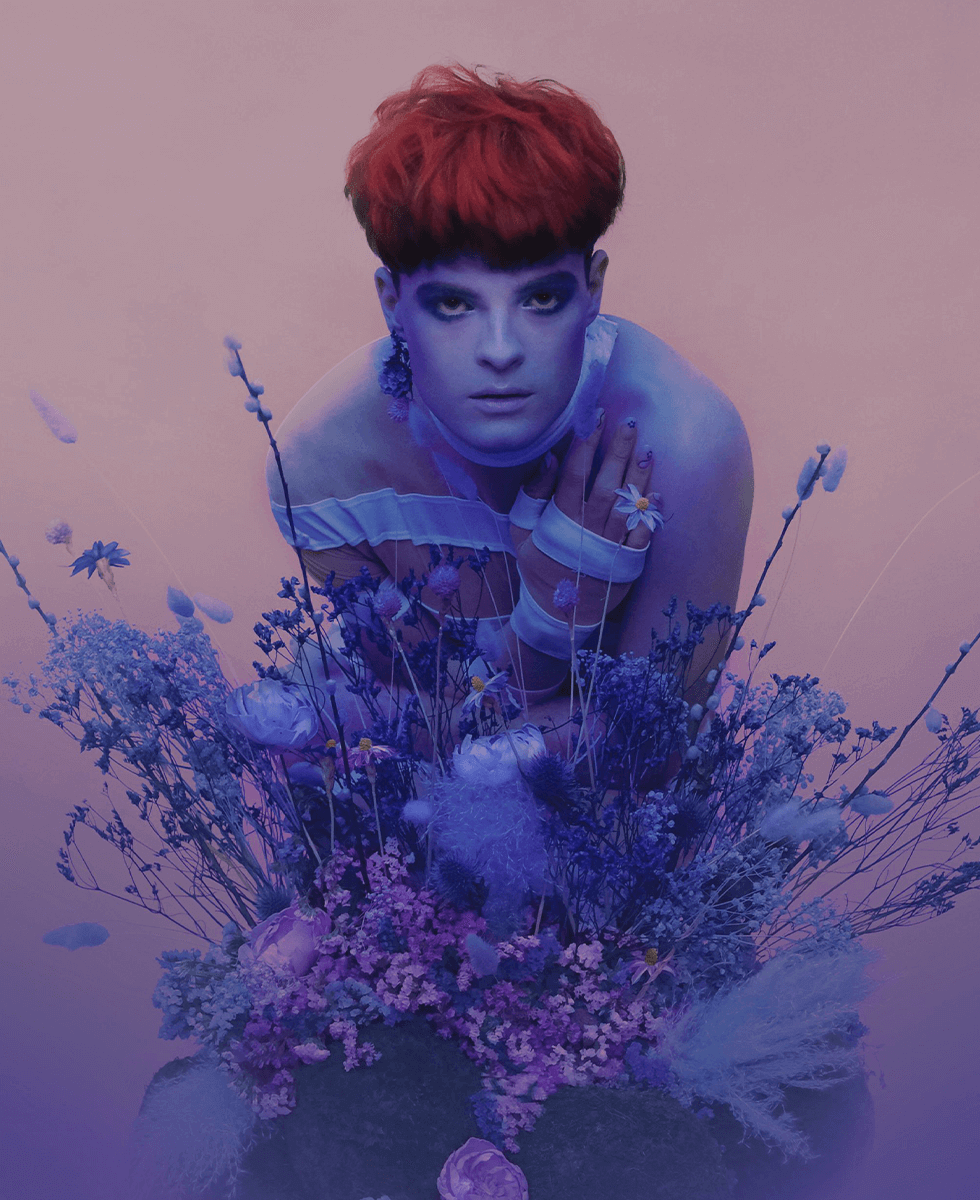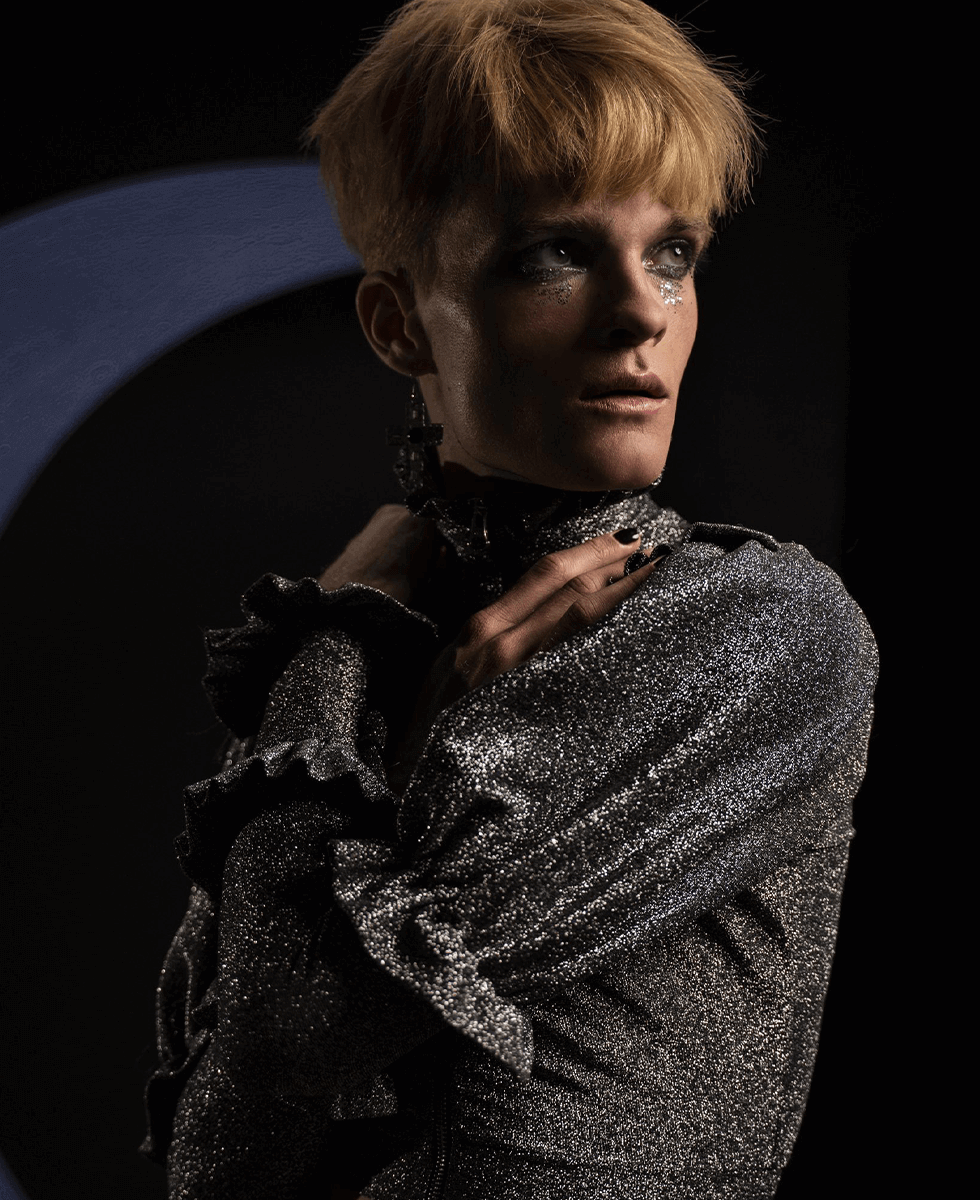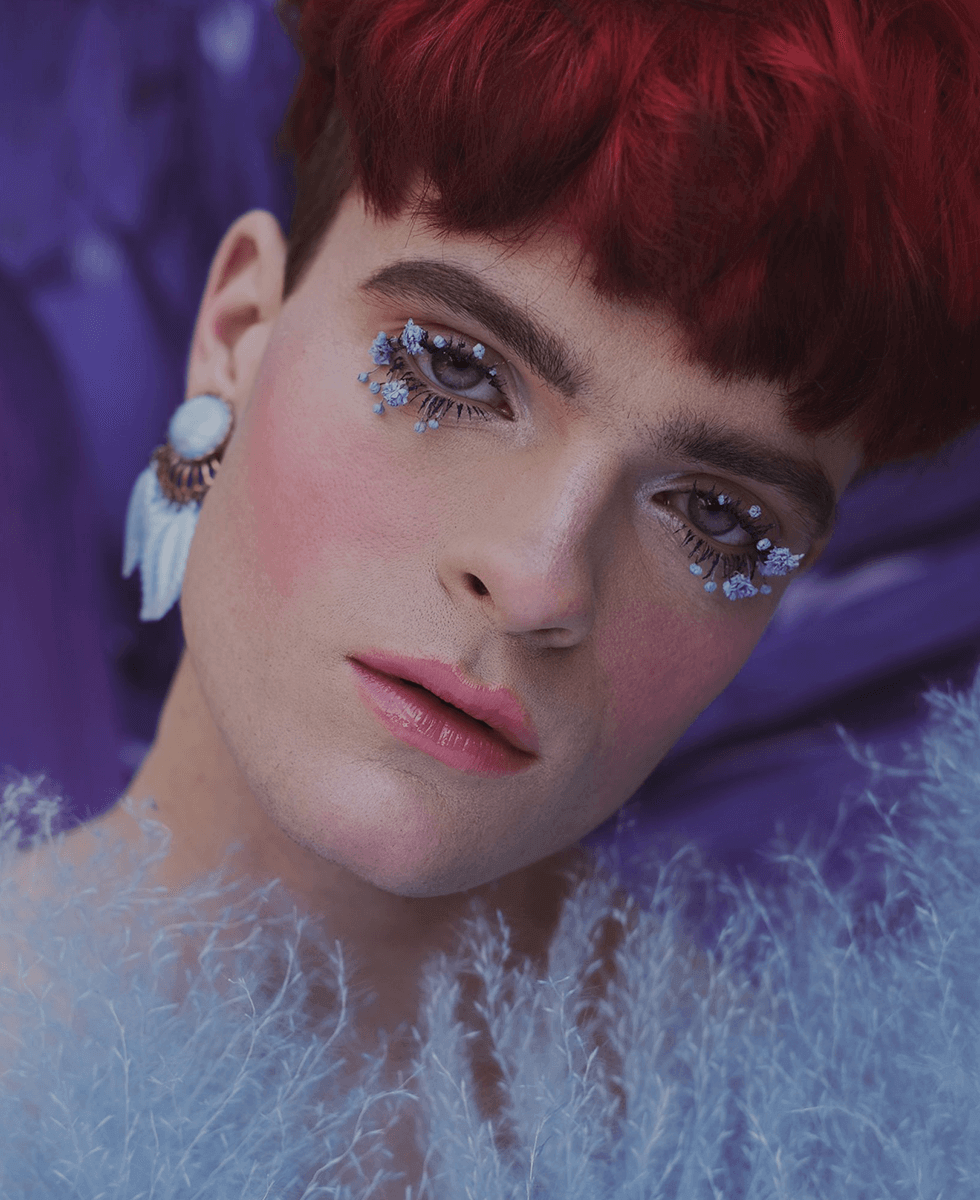Jake Wesley Rogers embraces the humanity in creativity
Jake Wesley Rogers talks powerful storytelling, seeking surprises in songwriting and finding truth in art.
“I’ve always loved music,” Jake Wesley Rogers starts. “My mum worked in radio, so I was always going to concerts as a kid.” Drawing comparisons with the likes of Elton John and heavily inspired by Lady Gaga, Jake Wesley Rogers is a singer, songwriter and pianist hailing from Ozark, Missouri. Channelling ‘70s glam pop through a contemporary lens, Rogers has a knack for emotive lyricism that underpins his bold and unforgettable visual performances. Allured by the appeal of the stage as a child, he has captivated audiences as a contestant on ‘America’s Got Talent’, but now the 25-year-old forges his own path as a beacon of exuberant self-expression, vulnerability and truth.
“The performing got to a place where I wanted to tell my own story and that’s when I started writing my own songs.”
“I just had this strange desire from a really young age to be on stage. I started doing theatre first because I loved performing. Then the performing got to a place where I wanted to tell my own story and that’s when I started writing my own songs.” 2016 saw the beginnings of Rogers’ independent music releases. With the ‘Evergreen’ EP in 2017 and the ‘Spiritual’ EP in 2019, Rogers began laying the groundwork for his voice as an artist.

“I was really obsessed with Adele, Regina Spektor, Florence and the Machine– all these really fierce storytellers, and I feel like they led me to the piano.” He began studying their work as he looked to define his own craft as a musical storyteller. “When I was in sixth grade, I probably wrote 30 songs that were really bad Adele songs, and then it leads you to what you’re supposed to say and your art. It’s just the process.”
In 2021, Rogers signed to Facet Records, an imprint of Warner Records, and subsequently released his 2021 EP, ‘Pluto’.On ‘Pluto’, Rogers further still pushes the boundaries of his songwriting, building into an anthemic sound with poignant lyrics.
“I was quite surprised listening to my EP ‘Pluto’. I thought, ‘wow, these are way more upbeat and anthemic than I thought they would be’, but they also felt right because within that power you can put in a lot of truth and story. Just because something is upbeat and sounds fun, doesn’t mean that the story in it has to be. Those are my favourite songs; the ones where you listen to the words and think, ‘oh my god, that’s the saddest thing I’ve ever heard’ while you’re dancing.”
“Just because something is upbeat and sounds fun, doesn’t mean that the story in it has to be.”
Lyrically, the world that Rogers creates is vivid with astrological allusions and biblical imagery. “I’m very inspired by the words,” he explains. “There are many ways to listen to music but I’m realising that there are some people that listen to music, and they don’t listen to the words much, it’s more about the music and how it makes them feel.”
Having studied songwriting at Belmont University in Nashville, lyrics drive his creative process. “I crave a smart lyric, a vulnerable lyric. It’s the coming together of the lyrics and the melody, but I geek out over lyrics.”
The visual world of his lyrics translates into the grand instrumentation. Rogers captivates with consuming vocals and piano, full orchestration, and crescendos. When Rogers writes, the song performance is always in mind.
“I love drama,” he laughs, “I love a song that builds, and I love big synth hits. On stage those are moments where the bass is really heavy, and you can feel it in the room; I live for that. When I’m writing, I’m also thinking about performing and what it would be like to perform the song. With live sets you have to build them carefully and they have to take you on a journey and ebb and flow.”
“When I’m writing, I’m also thinking about performing and what it would be like to perform the song. With live sets you have to build them carefully and they have to take you on a journey and ebb and flow.”
That flow continues into his songwriting practices. “I’m someone who is quite happy just sitting at the piano and ‘stream-of-consciousness’ letting something just flow out,” he says. “Those are my favourite ideas, and I take those ideas and maybe work with a producer, and it transforms into something that sounds bigger. It starts in that true moment where I’m alone and just with the piano.”
While he may approach different instruments to spark creativity, Rogers’ songwriting process tends to stay within the realms of him and the piano. “It’s usually just piano, I have a Wurlitzer,” he explains. “I love synths, they’re really fun. I do play a bit of guitar, but I’m not great at it,” he laughs. “It’s funny how a different instrument can get you out of your head, and to create in a way that you don’t normally create, can lead to something different and new.”
“I think my superpower is sitting at the piano and singing. People have been doing that for hundreds of years, and will probably never stop doing that,” he laughs. “Some things just don’t go out of style, I would argue.”

Seeking surprises
For Rogers, being surprised is the best feeling while songwriting. “It means that you’ve suddenly been jolted from the reality that you thought you had,” he explains. “I start thinking, ‘okay we’re on to something’ because I’ve been caught off guard. If I’ve caught myself off guard, I think this will also catch other people off guard. I love that feeling. It’s not rare, but it’s special. I guess some people will call that the ‘muse’ or the ‘divine inspiration’– I think it’s all those things.”
Lately, Rogers has been trying to find ways to induce that elusive inspiration and make it a more regular occurrence. “It’s tricky,” he says, “I think any creative person knows that there’s this unexplainable thing that can happen where you’re struck, it feels like lightning; it just happens. Sometimes you’re on the highway or sometimes you’re at a family dinner, it’s quite inconvenient.”
“That’s what art should do, it takes you out of this reality and takes you to a more ‘real’ reality.”
“What we do have control of as creators is actually sitting down, attempting, and also just staying inspired. I think that’s key,” Rogers continues. “I started a list of things that inspire me– scenes from movies or little anecdotes that when I close my eyes and think about them, it takes me to another world. And that’s what art should do, it takes you out of this reality and takes you to a more ‘real’ reality.”
“The space of art is where we’re most free and most ourselves,” he continues. “As artists, to stay in that inspirational space is amazing and I’m trying to lean into that. There are scientific facts, but there’s a truth that only art can lead you to. It’s a truth that I don’t think you can prove, and I think that’s why it’s the truth.”
While in college, contemporary artists were regulars in his musical catalogue, but he also ventured towards the ‘Glam Gods’– Elton, Freddie, and Bowie to name a few– more as a study of their artistry. As a result, chord structures and melodies he heard along the way naturally became a part of his musical lexicon.
“When I sit down at the piano, I’m never consciously thinking of that, but it’s in me. I’m making pop music with mostly organic instruments, and a lot of the chords I love have been really influenced by ‘70s rock and singer-songwriters. For whatever reason, it does it for me. All we can do is follow whatever does it for us”, he laughs.
While you may hear echoes of the past in his melodies, Rogers’ music is championed by its modernity. They’re modern stories told with an authentic quality that you can relate to quite naturally.
“People use the word ‘timeless’ to describe music a lot and I don’t necessarily know what that means because everything is created in a time. For me, I listen to someone like Sheryl Crow, and I think she’s timeless in that you listen to a song like ‘If It Makes You Happy’ and it doesn’t feel like 1986 or 1970. All it does is feel correct in that moment. I love that. I also love things that could’ve only been made in that specific time, too. An Alanis Morissette record like ‘Jagged Little Pill’ is so ‘90s but so innovative, and still holds up because it’s authentic.”
Perhaps part of the reason why Rogers’ music feels nostalgic is due to specific production methods used in the studio to emulate familiar sounds of the past. “We make choices based on the time we’re in. A lot of the stuff I record, we’re using a lot of old equipment. We’re recording piano digitally but then putting it to tape. All those kinds of little tricks that give it that warm, nostalgic feeling, but you’re still making it through the lens of 2022.”

Embracing Humanity
Rogers is a strong advocate for letting humanity prevail in your creativity. He remarks on embracing spontaneity during the creative process. “The best songs are surprises,” he says. “Pretty much every song that I’ve released, some might be fragments from things I’ve started before or a title I was thinking about. My favourites are the ones where I’m just sitting down, and it just comes out. It’s frustrating to say because we don’t understand it but it’s freeing.”
Another choice few words he comes back to in times of need are from Benny Andersson of ABBA. “I heard him once say that every time he sat down to make a new album, he had this fear thinking, ‘Oh God, can I do this again?’ and he says, ‘I’ve done it before, and I can do it again’. It’s so gentle and nice. You weren’t someone else who made that, you were you. I’m in that place where I’m writing my first album and I have that fear thinking, ‘I loved that song I released, can I do it again?’ and I think sure, I can do it again.”
“If you write something you don’t like it’s not going to kill anybody and no one has to hear it.”
Finally, he reminds us that in the process of it all, you have to embrace your humanity and live life in order to tell the stories about it.
“If you write something you don’t like it’s not going to kill anybody and no one has to hear it,” he laughs. “I feel like making things feels so high stakes a lot of the time, and it is because art leads people and ourselves to a truth and love, so it’s high stakes in that way. But it’s low stakes in that you just have to be a human and do things that inspire you and live. Don’t sequester yourself. You need to live.”
Words: Zainab Hassan
Discover more from Jake Wesley Rogers on Twitter, Instagram and TikTok.
